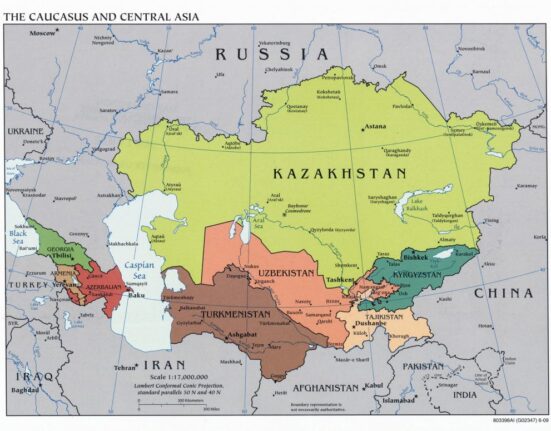On November 11, Bishkek hosted the 26th meeting of the Kyrgyz-Russian Intergovernmental Commission on Trade, Economic, Scientific, Technical, and Humanitarian Cooperation, co-chaired by Adylbek Kasymaliev, Chairman of the Cabinet of Ministers of Kyrgyzstan, and Alexey Overchuk, Deputy Prime Minister of Russia.
According to Kasymaliev, Russia is a reliable ally and strategic partner of Kyrgyzstan. Russia is also one of Kyrgyzstan’s main trading partners, accounting for 22% of the country’s foreign trade in 2024. Last year, bilateral trade almost reached $4 billion, and both governments have set a goal of increasing this figure to $5 billion per year.
To achieve this goal, Kasymaliev said, both governments have taken measures to develop e-commerce, improve the regulatory framework, reduce costs for businesses, expand logistics corridors, and strengthen support for exporters.
Kasymaliev reiterated Kyrgyzstan’s commitment to strengthening economic integration with Russia, developing transport corridors, and expanding cooperation in industry and energy.
The Kyrgyz prime minister noted that the reconstruction of roads around Lake Issyk-Kul in Kyrgyzstan is nearing completion, opening up new opportunities for investment, hotel construction, and the development of tourism services. In this regard, he invited Russian partners to participate in large-scale tourism initiatives—from the construction of tourist infrastructure to the development of medical and ecotourism.
For his part, Overchuk noted that Kyrgyzstan is Russia’s strategic partner and ally, saying that “Russian-Kyrgyz cooperation, based on a long history, mutual respect, and trust, is multifaceted and distinguished by similar approaches to regional and global issues and a focus on developing integration processes in Eurasia.”
According to Overchuk, trade turnover between Russia and Kyrgyzstan increased by 15.1%, to $3 billion, in January-August 2025, and the share of the Russian ruble in bilateral settlements for the first eight months of 2025 reached 96.7%.
Overchuk noted that Russia remains the main supplier of gasoline, diesel fuel, and jet fuel to Kyrgyzstan, supplying this fuel duty-free.
Humanitarian sphere remains an important part of Kyrgyz-Russian cooperation.
Overchuk said that the governments of Russia and Kyrgyzstan have begun implementing a joint project to build nine secondary schools with instruction in Russian across Kyrgyzstan.
On November 10, Kasymaliev and Overchuk visited the construction site of one of such schools, located in Bishkek and designed to accommodate 1,224 students.
Overchuk also announced that Russia is donating 651,000 Russian-language textbooks for secondary schools in Kyrgyzstan. “More than 90% of the textbooks have already been delivered to Kyrgyzstan and will be distributed to schools soon. We are also sending our teachers to work in Kyrgyz schools,” Overchuk stated.




